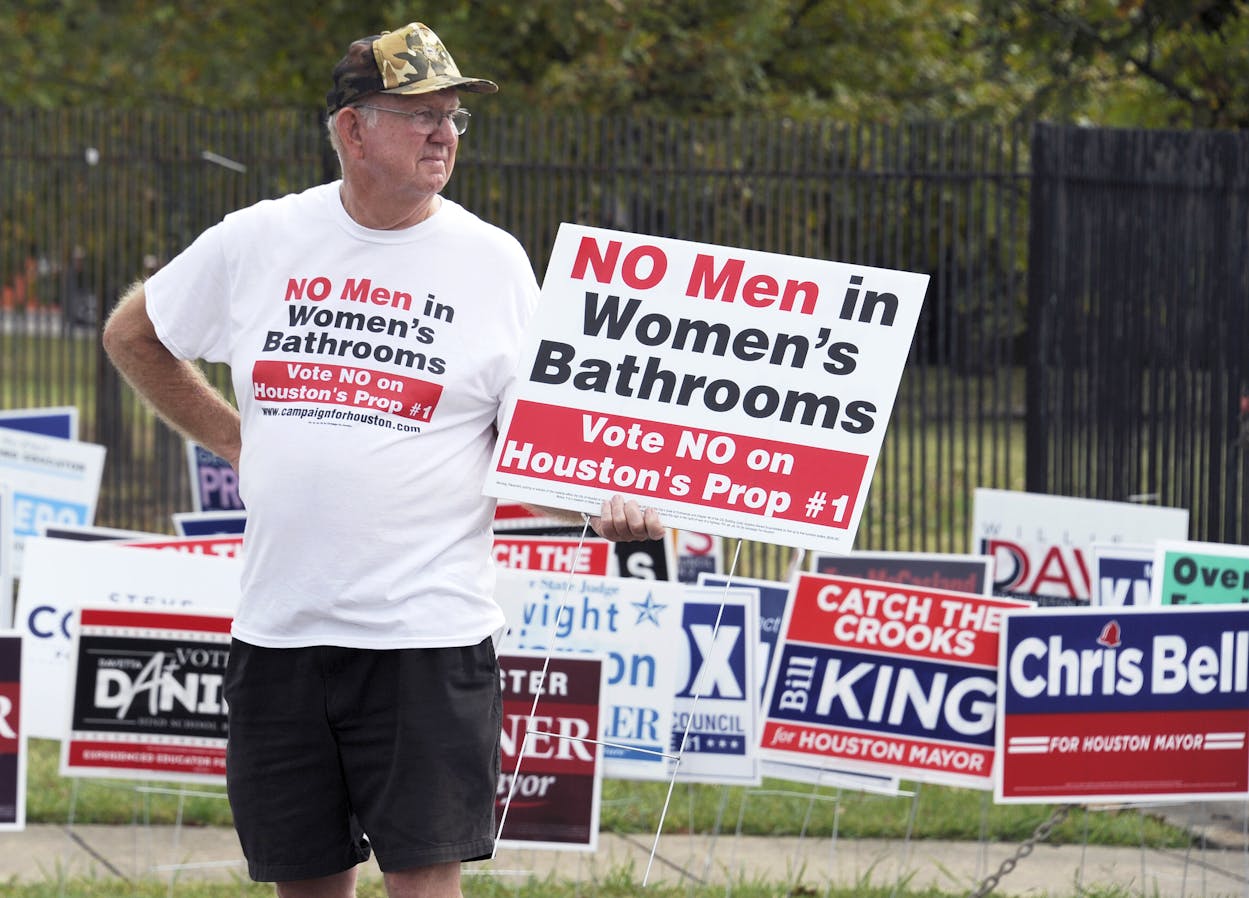The long, convoluted story of Houston’s Equal Rights Ordinance has finally come to its conclusion. After it passed city council in May 2014, the bill promptly faced repeal efforts, which ignited a small firestorm when city lawyers subpoenaed pastor sermons to determine if some were electioneering from the pulpit. The ordinance wound its way through the courts in the ensuing months, and ultimately found itself on the ballot for voters to decide on November 3. And the voters did decide. They decided that they did not want an equal rights ordinance in their city.
Houston’s Proposition 1, which would have ensured that all people—regardless of race, creed, gender, sexual orientation, gender identity, military status, age, disability, or just about any other factor by which a person is capable of being discriminated against—would be free to enter public spaces without fear of discrimination, lost by an overwhelming margin at the ballot box. A whopping 62 percent of voters opposed the measure. That’s a major defeat in a city like Houston—the nation’s fourth largest—and one whose political alignment is generally considered more progressive than the neighboring suburbs.
HERO’s defeat wasn’t unexpected. Texas Monthly‘s Mimi Swartz wrote about the organized efforts to ensure that equal rights would not be granted to all Houstonians last month; just last week, John Nova Lomax read the tea leaves that were the early voting returns, and suspected that the ordinance—which was generally regarded favorably by poll respondents—would fail among an electorate that was more conservative than the people who answered the polls.
Some are celebrating that victory. Lieutenant Governor Dan Patrick published a letter thanking those who turned out to reject HERO, explaining that “voters clearly understand that this proposition was never about equality—that is already the law. It was about allowing men to enter women’s restrooms and locker rooms.”
Much of the opposition to HERO centered around this belief. Houstonians may have expressed their opposition to transgender rights on Tuesday night, but they didn’t turn out with 62 percent of the vote in order to ensure that people in wheelchairs could be turned away from restaurants with impunity.
Contrary to Patrick’s celebratory note, Houston law now actually does allow men to enter women’s restrooms and lockers. In fact, it requires that transgender men do so.
#transawareness #occupotty #translivesmatter #wejustneedtopee pic.twitter.com/b0f1znAYRh
— Michael C. Hughes (@_michaelhughes1) March 11, 2015
That’s strange irony that makes the “men in women’s restrooms” arguments seem disconnected from some people’s reality. But there are transgender men in Houston, and Houstonians, in their eagerness to determine where transgender women are allowed to pee, have ensured that fellas like Hughes will be in the bathrooms with their daughters.
The fact that language like “men in women’s restrooms” treats transgender men like they don’t exist is worth noting, but the most instructive thing one can draw from HERO’s defeat is that the new frontier of civil rights in not just Houston or Texas, but the United States, is clearly transgender rights. The fact that an ordinance designed to ensure equal protection for fourteen groups was reduced to a fight to keep transgender women from using women’s restrooms makes that abundantly clear.
It’s easy to read that as a backlash to the way that transgender people—especially trans women—have experienced increased visibility in the culture in recent years. Caitlyn Jenner is an easy example, but she’s hardly the only trans person to make headlines lately. Laverne Cox, Janet Mock, Fallon Fox, Laura Jane Grace, Chaz Bono, and others have ignited a national conversation about what gender means and how people identify; so have award-winning TV shows and movies like Transparent and Dallas Buyer’s Club.
Until fairly recently, it was easy for people who didn’t know any trans people to forget they existed. That swung both ways—there were fewer people who felt much need to form an opinion on whether transgender women were, in fact, women, but there were also fewer people pushing to protect their rights in the first place. Now, though, that conversation is happening in places where it was previously ignored—and as a result, it seems that people are eager to weigh in.
The way that Houston weighed in tells us a few things. But the most obvious takeaway is that right now, using one of the country’s largest and most diverse cities as a bellwether for trans rights, the defeat of Proposition 1 tells us that there’s still a long way to go.








